Itayi Artwell Mareya1, Eden Adelaine Mareya2, Liberty Artwell Mareya3, Amanita Ropafadzo Mareya4
1Department of Foreign Languages, Hanjiang Normal University, Shiyan, China
2Department of Modern Post, Chongqing University of Post and Telecommunication, China
3Department of Science and Technology, China Jiliang University, Zhejiang, Hangzhou, China
4School of Child Care, Hubei Senior Vocational College, Hubei, Shiyan, China
Correspondence to: Itayi Artwell Mareya, Department of Foreign Languages, Hanjiang Normal University, Shiyan, China.
| Email: |  |
Copyright © 2024 The Author(s). Published by Scientific & Academic Publishing.
This work is licensed under the Creative Commons Attribution International License (CC BY).
http://creativecommons.org/licenses/by/4.0/

Abstract
The research was carried out using questionnaires to students in Chinese Universities from various countries involving Brazil, Russia, India, China and Africa The rising of BRICS group of nations in the world’s Social, Economic and Political affairs has influenced the emerging economies in the Global South for their voices to be heard in the world. The exclusion of the Global South’s native languages in the United Nations as official languages is leading the BRICS member states to advocate the adoption of some local languages in the block in their communication. Apparently there are only six official languages used in the United Nations which are English, French, Spanish, Russian, Chinese and Arabic. The research found out that many people best express themselves in their local language than in colonial languages imposed on them some centuries ago. The researchers recommend establishment of a BRICS Fund towards learning of the BRICS five common languages and promotion of BRICS Intercultural Exchange programs in the member countries.
Keywords:
BRICS, Global South, Global North, Swahili, Hindi, New World Order
Cite this paper: Itayi Artwell Mareya, Eden Adelaine Mareya, Liberty Artwell Mareya, Amanita Ropafadzo Mareya, Analyzing How BRICS Major Languages Increase Social, Economic & Political Chances in the World, American Journal of Linguistics, Vol. 10 No. 2, 2024, pp. 23-36. doi: 10.5923/j.linguistics.20241002.02.
1. Introduction
‘They think in their local languages and express themselves in foreign languages imposed on them by their former colonial masters’. The United Nations uses only 6 languages which are regarded as official. Among them are 4 European languages which are English, French, Spanish and Russian. The other 2 United Nations official languages are Chinese and Arabic. Other populated regions and countries whose indigenous languages are not represented includes Africa, India and many other Asian countries. These regions and countries only use languages imposed on them by their former colonial masters who happens to be Western Europeans. These colonial languages may be very difficult for these countries’ people to fully understand speeches made by their leaders when they attend international forums and conferences. Ekkehard Wolff H (2017) asserts that Africa is caught between two language ideological phenomena on what the people should do in terms of the influence of colonial language and cultural effects on African indigenous languages and cultures.The emerging of BRICS organization preaching a multi-polar world system may allow these regions and countries to find their local languages being heard and understood in international communications. Zeleza PT (2006) asserts that African identities just as African languages are not immune from existential. This has been historically predicted during the colonialism period of Africa whereby the missionaries and advocated the learning of colonial languages to local languages. The exclusion of any African language from UN official languages is one example of the OWO system to wipe out African identities and cultures. As Isheloke BP (2019) shows that there are over 6000 languages in the world and a recognition of national languages is a priority by many countries especially in international trade but subsequently English like the USD now serves as the universal language in international trade therefore erasing the win-win aspiration of the GS countries. The following are the major BRICS languages spoken in their countries and other regions in the GS; Portuguese in Brazil and other parts of the world, Russian spoken in Russia and many other parts of Eastern Europe, Hindi in India, Chinese in China and Swahili spoken in most parts of Africa. The learning of these languages by BRICS member states brings out a lot of opportunities in the world. However there are major challenges that will be faced in order to see that this happens. The first challenge is of a BRICS fund towards the establishment of BRICS language Institutes across the globe. The second challenge is acceptance of these language learning institutions by locals due to suspicions. The third challenge is the suspected fight back by the Western powers who may feel the wading away of their influence and hegemony on world affairs. According Cooper A.F (2016) the BRICS organization was a reaction from competing world powers such as China, India, Russia, Brazil and South Africa in the wake of the financial crisis of 2008. The need to reshape the world order dream was then established in the form of BRICS as a challenging force against the west.The researcher has however reached to the people of the GS and came out with solutions and recommendations for a successful establishment of a BRICS language learning initiative.
1.1. Research Background
The expanding Global South, led by China, and the dominant Western nations, led by the United States, are engaged in a war over who should govern the globe. The prominent international languages spoken in the West, such as English, French, and Spanish, are in competition with the BRICS languages. Many individuals believe that the dominance of western languages has contributed to the erosion of other native languages of other countries, creating a cultural gap in understanding other people's cultures, despite the fact that western languages have made significant contributions to the global communication network.
1.1.1. Advantages of Learning English
Since English is one of the most widely used languages in the world and is recognized by the UN as an official language, many nations consider it to be their first or second official language. This demonstrates the significance of the English language and how hard it is to eradicate as English is spoken by the majority of Africans both domestically and internationally. The United Kingdom, the United States, Canada, Australia, and New Zealand are considered to be native English speakers. The majority of international students enroll in the best colleges in these nations. As a result, admission to colleges in these countries requires fluency in English. Here are some sample statistics for Chinese students who studied overseas. Luo Chaoping etal (2014) and Liu Ping etal (2019) asserts that globalization has created a need to access opportunities in the way of study abroad. The US, UK, Canada, Australia and China have emerged as the most favorite destinations for most foreign students.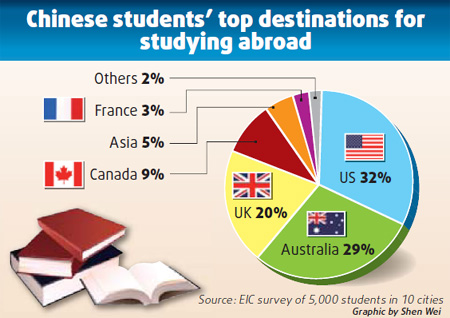 | Figure 1. Study abroad statistics for Chinese students |
Because English is so important in the world, it is impossible to learn the language without also learning English culture. For this reason, Akhmetshin E.M., Makulov S I et al. (2017) define intercultural communication barriers as the world of people interacting because of their differing ideologies. Gaining proficiency in English allows one to communicate with over half of the world's population. According to Lie Q A (2019), individuals are frequently divided and separated by their culture. Chinese students studying abroad have difficulties learning English, according to Nomnian S. (2018). This is true even though English is a mandatory language in Chinese primary schools. Yue Qi G. (2016). All curricula in Zimbabwe are taught in English, which increases students' comprehension of global issues and boosts their competitiveness. 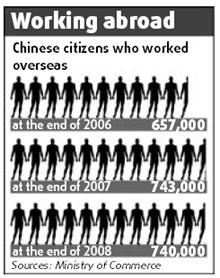 | Figure 2. Chinese citizens working abroad |
1.1.2. Disadvantages of Learning English
The process of learning English has numerous drawbacks. Given the history of the way how English became an official language in many countries has always been the bone of contention by many people who assert that English was forced on them during the British colonial moments.• Some local cultures and languages, along with their values and beliefs, are being washed away. Nowadays, it is nearly impossible for the locals of Zimbabwe to speak their own tongue without blending it with English.• The influence of English, which occasionally fails to convey the meanings of local languages, may be the reason why Zimbabwean pupils typically perform poorly in school. Students' performance in other areas that require communication in English is mostly impacted if they struggle with the language. Students from Zimbabwe communicate themselves in English while thinking in their native tongues.• Any further significant drawback of learning English is the absence of diversity. Diversity in language and culture benefits the world greatly.Table 1. BRICS’ 5 major Languages
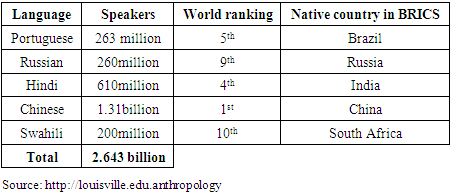 |
| |
|
N/B Swahili is not a South African language but it is Bantu language that is widely spoken in Southern Africa and was adopted as a SADC regional language which is being promoted in SADC countries’ schools for children to learn it. It is spoken in more than 14 African countries including Tanzania, Kenya, Uganda, Rwanda, Burundi, DRC and many others. It is the official language of the African Union. The researcher has suggested Swahili language in replacement of South African popular local languages such as Zulu, Xhosa, Ndebele and many others which are not spoken anywhere else in Southern Africa apart from South Africa and just a few neighboring countries to South Africa. I wish the readers will take the researcher’s suggestion as justified.
2. Literature Review
Causes and Effects of New World Order (NWO) Quest.
2.1. Old World Order (OWO) vs the Global South (GS)
The (OWO) a global security structure established by the US and allied forces after the Second World War (WW2) created world stability and brought wealth and prosperity to the Western countries who took advantage through exploitation of African natural resources and cheap energy from Russia to enrich their economies to the disadvantage of the (GS) countries. The West benefited from Chinese market, Russian energy and African natural resources with cheap labor from India and Latin America and Africa. The Western block who have described itself as the world’s enlightened world versus the jungle. The United Nations headquarters have since been established in none other than Western capitals such as the ICC in Netherlands, World Bank in the USA, IMF in the USA, UNSC in the USA and WHO in Geneva, United Nations official languages comprises of English, French, Spanish, Russian, Chinese and Arabic while Africa, India and Brazilian languages are nowhere to be found. These countries are therefore naturally forced to use their former colonial masters’ languages which were imposed on them centuries ago to speak at the United Nations forums and conferences. The UNSC permanent members have 5 countries which represent the world. The West is represented by the US, United Kingdom of Britain, France while East Europe is represented by Russia and Asia represented by China. Africa which has 54 countries with less economic development is not represented at the UNSC. Qobo Ningiza (2022) shows that the UNSC’s continuous rejection of a permanent seat for African countries or as an African Union has faced its test of legitimacy from the GS countries. Currently as asserted by Armijo LE and Roberts C (2014) the GN consisting of the US, EU and allies acknowledge the shift of global economic and political power from them tilting to the GS led by BRICS. The US National Intelligence Council (NIC) predicts the diffusion of this shift will be visible by year 2030.Luckhurst J (2013) in his journal acknowledges how the BRICS organization had influenced the foreign policies and economic and political policies of both the industrialized states and emerging economies.
2.1.1. Old World Order (OWO) vs New the World Order (NWO) Led by the Global South (GS)
The (NWO) driven by the emerging economies led by Brazil, Russia, India, China and South Africa (BRICS) nations founded in 2009 with enormous support from countries of the (GS) whose population is arguably put at 80-85% outside of the West and contributes 40% of the world’s GDP. The OWO as now being assumed by most of the world population thinks that it did not provide equal social, economic and political opportunities to most of the world population especially found in the GS. The assumed bias in many global issues by the West against the rest is assumed to be coming to the end by the rise of the GS led by BRICS whose intentions as asserted by Bangt-Ake Lundvall (2009) as to create alternative social, economic and political development towards a multi-polar world system. The rejection of anything if not everything be it technology, inventions started in the other parts of the world which is not the West or from the West’s allies with a bias of ‘national security threat, overcapacity, unreliable, unfair practice etc’ assumptions has led to a wave of a new advent of a NWO led by the BRICS organization. China is one country that has found itself from its products and initiatives such as; Huawei saga, Belt and Road Initiative (BRI),Electric car European deal, China-US trade dispute and many others that have seen the West led by the US to reject Chinese products and initiatives.
2.1.2. COVID 19 Vaccine Distribution Disparities
The outbreak of COVID 19 in the first month of 2020 was received differently by various countries. Some countries acted quickly and closed their boarders with other countries in order to prevent the spreading of the virus while others acted slowly giving themselves time to observe the movement of the virus among people. Vaccines were manufactured more than 8 months later after the pandemic had already killed hundreds of thousands of people across the world. Developed countries had the access of funds, resources, equipment and facilities to make some vaccines quickly while underdeveloped countries especially in the GS couldn’t get enough support even from the WHO and WB with funds to fight the pandemic. After a few Western countries had the access to some vaccines the vaccine was not made available to most of the GS countries until China had its own vaccines were made available that is when most of the underdeveloped countries started getting some vaccines from China. Even though the Western countries denounced the Chinese vaccines most of the GS countries Russia included received the Chinese vaccine and gave it to their people.
2.1.3. Climate Change Blame Policy
The rise of industrial revolution in the 17th century brought about environmental air pollution resulting in the quick rise of temperatures to normal high. This happened during the industrialization period led by Western countries whom today are called the most industrialized countries. Ever since then global temperatures having rising without limit causing to the current climate change the world faces itself in. Climate change forums have been held several times with the aim to curb the emission of carbon dioxide by means of reducing the use of fossil fuels and promote green energy. Instead of assisting the underdeveloped countries who contributed less emission of carbon dioxide the West insist to share the damage equally with the rest of the world. The GS finds itself being forced to comply with action in the cutting down the use of fossil fuels to develop their poor countries along side the developed West which has benefited much from the use of fossil fuels for the past century.
2.1.4. Human Rights Bias
Upholding Human Rights is a duty of every government across the world ever since many years. Regardless of different cultures, religious beliefs and norms the issue of Human Rights has not been disputed until the rise of NGO s established and funded in the West.The purpose of the UN Human Rights Charter is to protect all people of the world from human rights abuses. Perpetrators of Slavery in the US government, Colonialism in the West, illegal wars and killings of civilians in many countries such as Iraq, Libya, Yemen, Syria, Afghanistan, Palestine, Serbia and many other places by either the US and Allies or NATO forces has left the human rights criminals unaware of the ICC’s mandate in the world as the World’s criminal court. The GS has only understood how human the Western people are as compared to them. Many heads of states from the GS have made complains several times at world forums against the hypocrisy of the West when it comes to Human Rights offenses.
2.1.5. Economic Sanctions Bias
After the WW2 ended the US and allies assumed social, economic and political dominance of world affairs. The adoption of the USD as the world reserve currency and used as the petrol dollar in the buying and selling of fuel made the US to become the world ‘s very special country and economy.The US’s control of the SWIFT makes More than two thirds of world monetary transactions are transacted in USD. Going against the US ‘s foreign policy or interests usually results in a country, individuals or organizations to be sanctioned by the US while the enforcement of the sanctions is collaborated by the US’s allies. Currently most of the sanctioned countries in the world have been sanctioned unilaterally by the US and its allies and not by the UN. Examples of the countries include Venezuela, Cuba, Zimbabwe, Syria, Iran and Russia with the exception of North Korea which is under UN sanctions since 2006. These unilateral sanctions have made many countries to think twice such as what the BRICS countries have already started like the use of their individual countries’ local currencies in their bilateral trade and business with a plan towards de-dollarization. The weaponization of the USD by the US has played a very crucial role for the GS countries to come up together to find out solution without the USD and the SWIFT. The introduction of (mBridge) a monetary system almost similar to the SWIFT by China is a sign and effort to wean out from the Western Economic hegemony.
2.1.6. Global Wars and Hypocrisy
The US and allies for the past many decades have started numerous unprovoked wars in the world especially in the middle east and Africa where many innocent people lost their lives. Since then there has not been a single person taken to the ICC for the war crimes committed. Examples of countries that have suffered wars from the US, NATO and allies are; Libya, Syria, Vietnam, Afghanistan, Yemen, Iraq, Palestine, Serbia, Bosnia and Herzegovina, Kosovo, Somalia and many others. While the US, NATO and allies are supporting Ukraine against the Russian Federation with money, arms, artillery, military training and strategies the GS seems to be behind the Russian Federation’s operations in Ukraine though they may not support with arms but the moral support tells a lot especially when there be any World war between the West and Russia the situation will be altogether different compared to that of the WW2.The condemnation of the Russian Federation’s military operations in Ukraine and the number of sanctions imposed on Russia with comparison to the previous wars led by the US and allies including the recent fighting between Israel and the people of Palestine leaves a lot to be desired. The GS believes there is a lot of hypocrisy by the US and allies when it comes to wars and world conflicts.
2.1.7. Immigration Policy Bias
Immigration has always been happening ever since many centuries ago. With rise of nationalism a lot of governments happen to dislike other people coming to settle into their countries in fear of many things among them; intermarriage with other races, diluting of local cultures, taking away jobs of the locals, crime and others due to their racism. Currently many countries now were found by immigrants such as the USA and others through colonization such as Australia, New Zealand, Canada and others. Most of the Western nations colonized some countries in the world and others engaged into slavery. The current 54 African countries only Ethiopia was not colonized and Liberia was founded and established as settlement place for freed slaves from the US. The Berlin Conference of 1885 gave birth to the scramble for Africa by Western nations who divided the continent among themselves. Today many African immigrants found themselves in Western capitals of Europe in search of a better life. Those who were colonized by the French migrate to France and the rest to their former colonizers’ countries where communication isn’t a problem. Other immigrants who go the Western countries happen to come from the Middle East where they run away from unending wars instigated or waged by Western forces such as Syria, Iraq, Afghanistan, Yemen and Palestine. Most of these immigrants are returned on the boarders of the Western countries back to their countries or taken to Rwanda in Africa where Britain has entered into an agreement to transfer their immigrants to that country. The US has been struggling with immigrants from South America while building of a boarder wall between the US and Mexico has been taken as a policy and campaigning policy by the Republicans so as to stop the immigrants into coming into the US. The Western countries amid the chasing away of immigrants from other parts of the world has been blames on racism when they started taking in refugees from Ukraine asserting that Ukrainians looked like them. It is from such acts of selective measures practised by the West when it comes to immigration policies that most of the GS countries found themselves supporting the BRICS countries.
2.1.8. Sports Qualifiers’ Bias
Sports games have brought the world together than before through the gathering of contestants representing their countries in sport. Taking for an example of soccer world competitions held since 1930. Regardless of the criteria and methodologies used for countries to qualify countries from the GS have a sentiment and assumption of manipulation of the systems in favor of the Western countries. This has also been noted in the qualification to host the FIFA World Cup finals where other continents may be requires to provide more teams than other continents. In most of the times western Europe has the biggest number of teams to represent to the sports competitions such as the FIFA and in the Olympics games.Table 2. FIFA Qualification criteria and Host record
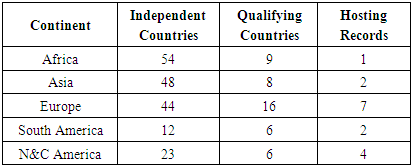 |
| |
|
Table 3. FIFA Qualifying
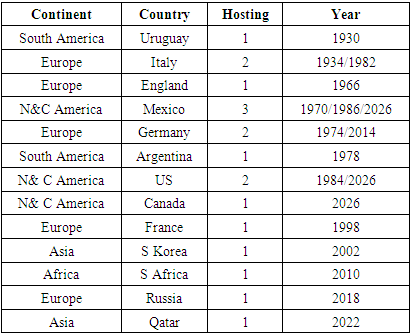 |
| |
|
2.2. Chances of Learning BRICS Major Languages
2.2.1. Social Chances
The long time undermining of indigenous local languages and cultures in many countries who suffered from slavery and colonialism had been immense for the past centuries of Western Social and cultural dominance. Learning of the BRICS ‘ five major languages plus others will help to create self esteem, self confidence, respect of other people’s languages and cultures. Gustavo Lins Ribeiro and Tom Dwyer (2015) asserts that BRICS countries brings a lot of social and cultural diversities to the world. Many world leaders in the GS usually fail to express themselves well at global forums and international conferences when using inherited colonial languages because their local languages are not regarded as UN official languages. According to Zhengdong Gan et al (2004), learning a second language is considered as a valuable success.Li Yuyun (2018) assert that cooperation in the five BRICS countries in higher education as very critical in order to promote people to people exchange programs.
2.2.2. Economic Chances
Teaching and Learning of foreign languages brings more jobs in a country. Firstly the teaching jobs will become available followed by school curriculum will be enriched by the availability of foreign language subjects. According to Paula Nistor (2015) the economic benefits created by BRICS countries as far as attraction of FDI s the group offers to international investors young labor force, natural resources, cheap labor force and a big market for international goods and services. Since the population size of BRICS countries is the biggest in the world so is the market size in terms of economic benefits to the world.Translators and foreign study scholarships will be vastly available. Government jobs in sectors such as Tourism, Immigration, Foreign Affairs, Home Affairs, Transport and many others not forgetting the mining sector will increase. People will not only in the West for greener pastures but elsewhere because of the knowledge of the BRICS languages.Table 4. BRICS’s Magic “R” Currency
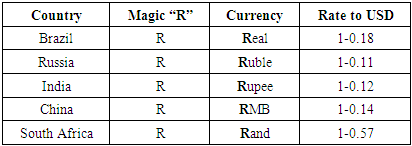 |
| |
|
Table 5. BRICS’s GDP vs The US’s GDP
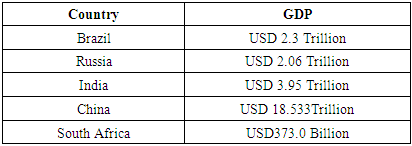 |
| |
|
Table 6. BRICS’GDP vs The US’s GDP
 |
| |
|
2.2.3. Political Chances
Learning or knowing the BRICS’ major languages will help create many opportunities politically. After many countries realized that only 6 world languages were officially recognized in the UN forums many people ended up only focusing on the 6 languages for communication and limited the whole world from coming together. if the UN had increased the official languages to include more languages from the GS everyone would be comfortable to communicate and interact with everyone in the world. Politically the learning of the BRICS’ major languages will improve international relations with many countries. Zaki Laidi (2012) asserts that the BRICS help to defend the sovereignty of its member states from external interference by powerful states especially those that are led by the US. This therefore brings some silenced voices of the GS countries into light to speak up their feelings and contribute to the global peace, development and stability.
3. Methodology
3.1. Research Questions
The research was guided by 10 questions among them are the following example questions.n Are you non African and can speak an African language?n Which Non-Official UN language do you speak among these? Portuguese, Swahili and Hindi.n Are there Social, Economic, Political chances for learning BRICS’ major languages such as; Portuguese, Russian, Hindi, Chinese and Swahili?n What opportunity can you get from learning the above BRICS’ major languages?n Would you like a BRICS language learning institute in your country?
4. Results and Discussion
4.1. Results
The results of this survey are contained in Appendix 1 document which is attached or may be supplied upon request. The authors have however detailed all the results in this section accordingly.• The questionnaire was responded by 169 people.87% from Asia, 11% from Africa and 2% from eastern Europe.• Among the people who responded 90% were of age between 18-25 while 7% were those between 26-35 years of age. Among those between 36-45 years of age there were 2% and 1% among those of 46 years and above.• According to those who participated in the survey there were 79% who claimed their gender as female and 21% who claimed their gender as males.• Regarding the educational background of the participants 3% were PhD students, 9% were those doing Masters degree, 44% Bachelors students and 44% university freshmen.• On the issue of whether the participants were satisfied with the current world order 40% said “yes” while 9% said “no” and 51% had neutral views.• When it came to the issue of the participants were satisfied with the World Health Organization (WHO)’s role in the world 55% participants said “yes” while 7% said “no” and 38% were with a neutral view of the organization’s role.• The participants were also asked whether they were satisfied with the role of the International Criminal Court’s role in the world. 49% said “yes” while 7% said “no” and 44% had neutral views.• The question regarding the role of the United Nations Security Council (UNSC) was viewed by 56% as satisfying while 7% had negative views of it while 37% had mixed views.• When the participants were asked whether the organization founded by Brazil, Russia, India, China and South Africa (BRICS)’s vision was satisfactory 78% said “yes” while 2% said “no” and 20% had a neutral view of it.• This question intended to find out whether the non-African participants could speak any indigenous African languages. 86% of the participants said “no” while only 4% said “yes”. Only 9% said they did partially speak.• The participants were asked if they could speak some of the BRICS common languages which are not regarded as United Nations’ official languages such as Portuguese, Hindi and Swahili. 17% said they did speak these three BRICS common languages while 33% said they did not. The largest number accounting to 50% said they partially did speak.• After having been asked if there were any social, economic and political opportunities for learning BRICS common languages 65% agreed while 14% disagreed. 21% however had mixed views.• The participants were asked about what major opportunities could they get from learning the BRICS ‘major languages as far as social, economic and political opportunities are concerned.56%said they would benefit more social opportunities while 36% said they would benefit from political opportunities. Only 8% said they could benefit economic opportunities.• The last question intended to find out whether the participants would like a BRICS language institute in their countries. 76% said “yes” while 5% said “no”. 19% were still not sure about this initiative.
4.2. Discussions
The survey was participated by more females compared to their male counterparts. This shows how more women are taking part in things dealing with international affairs. The survey and topic failed to reach many participants from eastern Europe and south America as intended by the authors however many participants took part from African and Asian students studying in China. Regardless of how most of the participants vehemently supported and satisfied with vision and goals of the BRICS organization many participants still have confidence in the current world order and its institutions such as the UNSC, WHO, ICC and many others. It has been revealed that regardless of how African countries are now independent from colonialism African indigenous languages are not recognized as official languages in the United Nations. This has led all African leaders to use their former colonial masters’ languages such as Portuguese, French, English and Spanish at world forums. This has been also been compounded by the absence of any African country to hold a permanent United Nations Security Council seat with veto powers. This dissatisfaction with the current world order has fueled the trust in the BRICS organization’s vision and goals by many countries of the GS. Many participants felt that learning of BRICS’ major languages are of great social and political benefits. The survey also revealed that most of the participants preferred to host BRICS’ major language learning institutes in their countries. This is contrary to the views by many western countries including the US who has in recent years banned Chinese’ s Confucius institutes in their countries asserting Chinese government’s influence in the institutes. The authors were of the view that instead of the BRICS organization’s individual members to initiate their language and cultural exchange institutes around the world they should establish a BRICS major language institute where the five major languages of Brazil, Russia, India, China and South Africa countries can be learned in tandem. The world has witnessed in recent months when Russia hosted the BRICS games in Russia where many sports games were arranged. This however looks as more of a sideshow against the traditional world sports games hosted by the Olympic games organizers who seems to get more back up from the western countries. This survey has however revealed the need to have diversity contributions by all people of the world for a better world compared to the legacies of the current world order which has seen the unending hegemony of the west in world affairs. Many people of the GS won’t forget how selective the means and ways of COVID 19 vaccines were distributed to the world where the west refused to share their vaccines with the world. The authors also discovered that it will be futile to talk about the learning of the BRICS ‘major languages without talking about the current world order and its institutions because the rise of the BRICS organization was as a result of the discontentment by many people with the current order and its institutions.
4.2.1. Way Forward and Recommendations
The way forward for the current world order institutions and the BRICS are to find each other to bring a predictable and trusted future with these world institutions creating a better world for everyone. The challenges that are faced by the current world order under the challenge from the BRICS organization can be solved by those who founded these world institutions soon after the end of the World War 11 by listening to the grievances of the developing world and other upcoming global organizations with alternative solutions to the current world crisis. The BRICS organization in the other hand should focus more on issues dealing with economic disparities faced by the world rather on politics. Strong economies bring favorable politics.
4.2.2. Recommendations
1. Establishment of a BRICS Fund for teaching and learning of BRICS five major languages (Portuguese, Russian, Hindi, Chinese and Swahili).2. Promotion of Sports and Cultural Exchange programs among BRICS member states.3. Offering of scholarships towards language learning.
5. Conclusions
Considering the rapid declining of the OWO led by the West and the rising of the GS led by BRICS countries the need for an establishment of BRICS language centers in the world to promote the five major BRICS languages such as; Portuguese, Russian, Hindu, Chinese and African languages such as Zulu or Swahili is now a priority. This has been found as one of the ways of fighting immigration flocking into Europe in pursuit of greener pastures. Language barrier in countries such as China, Russia, India, Brazil and Africa has resulted in many people prefer to go to European countries where English, French and Spanish is highly spoken. Most of the immigrants who entered Europe usually came from former colonies where European languages were imposed through colonialism. The selective measures given to the GS countries by the countries of GN on matters dealing with developmental projects has been questioned for many decades ago. The persistent frustration by countries of the GS has led to the formation of counter measures by leading economies of the GS such as BRICS countries led by Brazil, Russia, India, China and South Africa. The application of international based rule of law has been biased against the GS countries from imposition of illegal sanctions, Western led regime changes, climate change risk share bias, pandemic intervention bias and the bias of IMF and the World bank in allocation of loans and funds, the non-representation of GS countries in the UNSC for permanent seats. The ushering of a NWO is not in any way as a surprise to the GN countries because reactions the world has seen especially after the disparities shown on the distribution of COVID 19 vaccines few years ago and the hypocritical way the West has handled the war in Ukraine and in Palestine. The world is impatient about the long awaited NWO where peace, equal prosperity opportunities are available for all rather than wars, sanctions, and racism.
ACKNOWLEDGEMENTS
I acknowledge all the support received from all the participants in this survey. I also appreciate the great work contributed by university students at Hanjiang Normal University during class deliberations.
Appendix 1
Topic: Analyzing How BRICS Languages Increase Social, Economic & Political Chances in the World.QuestionnaireBackground Choose A,B/C
Choose A,B/C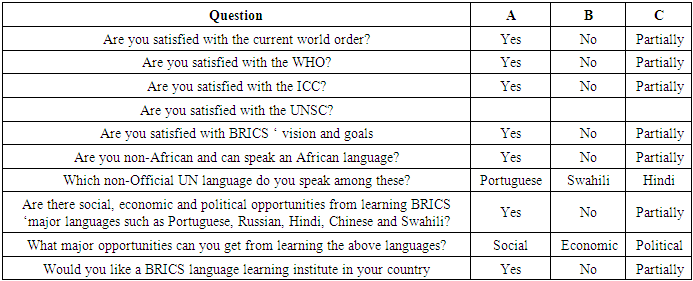
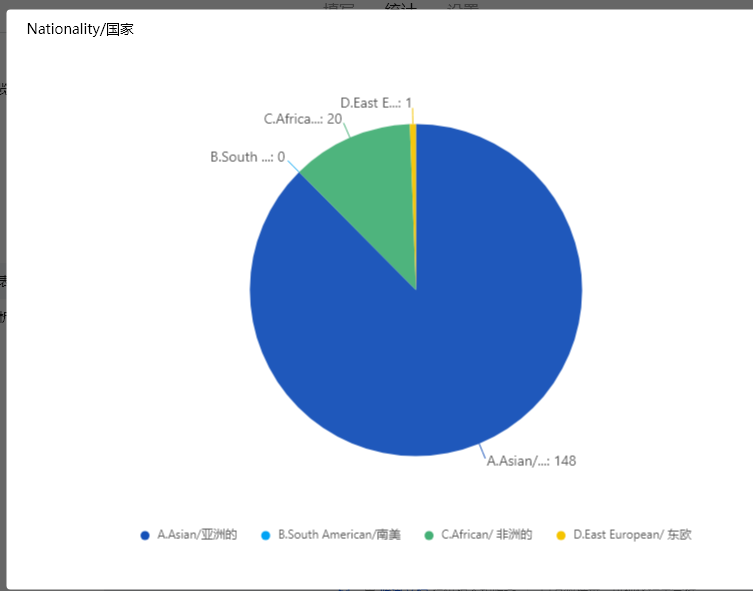 | Chat 1. Nationality Above |
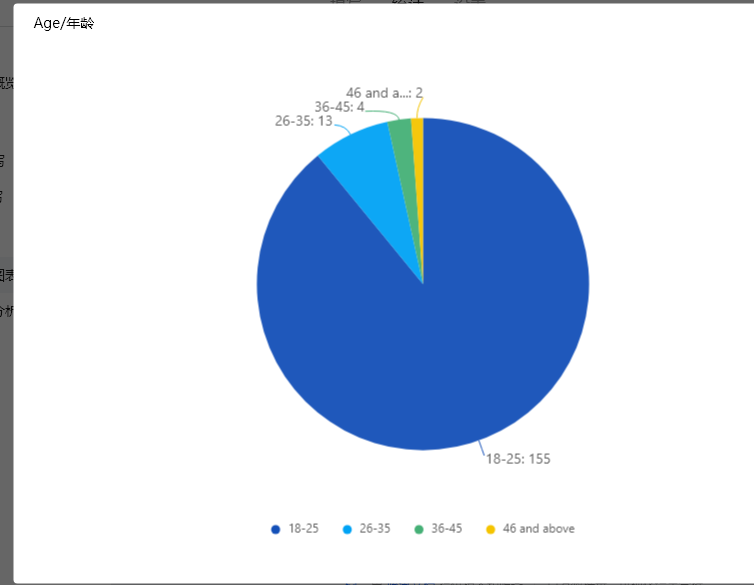 | Chat 2. Age Above |
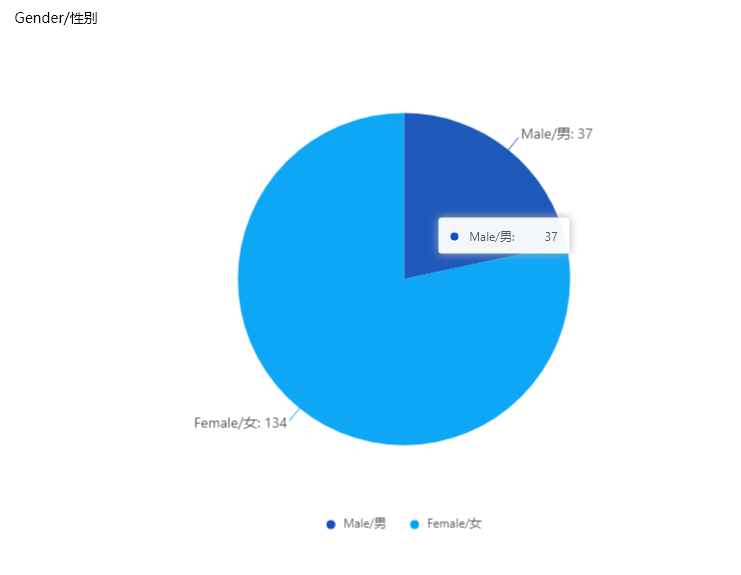 | Chat 3. Gender Above |
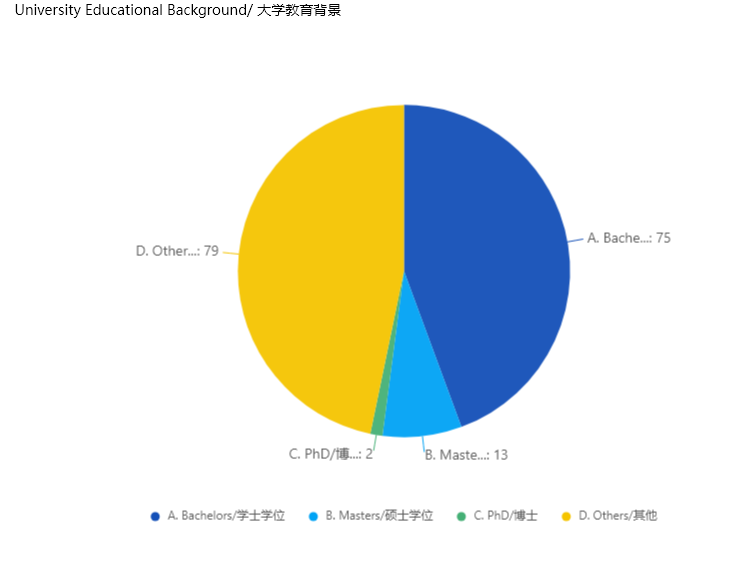 | Chat 4. Educational Background Above |
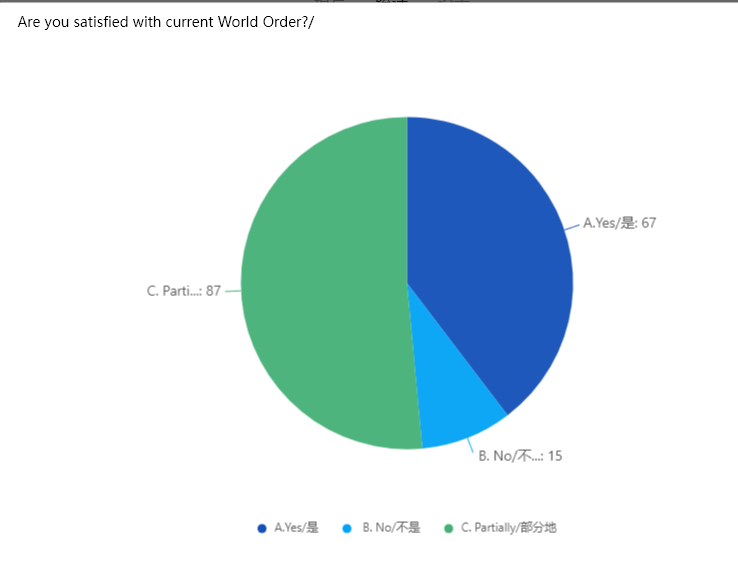 | Chat 5. Question No 1 Above |
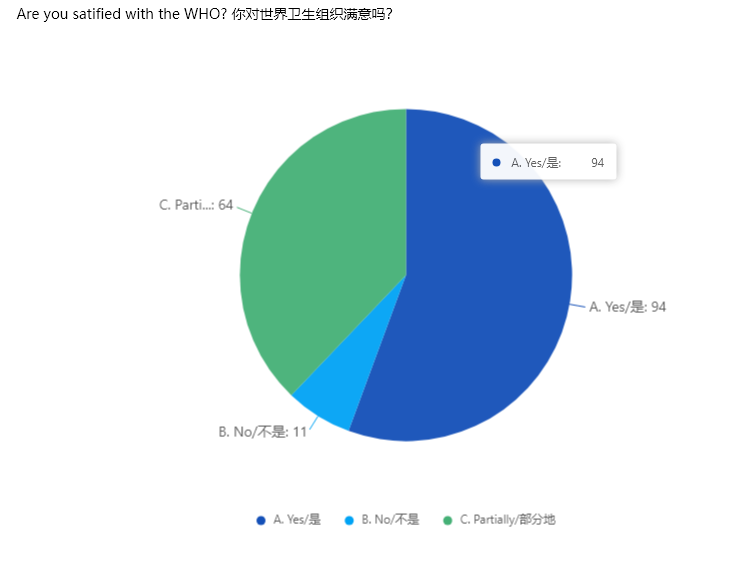 | Chat 6. Question No 2 Above |
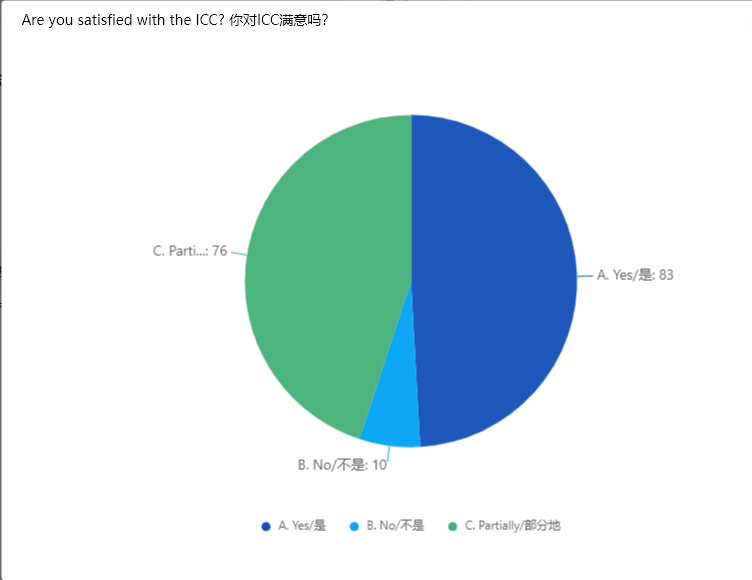 | Chat 7. Question No 3 Above |
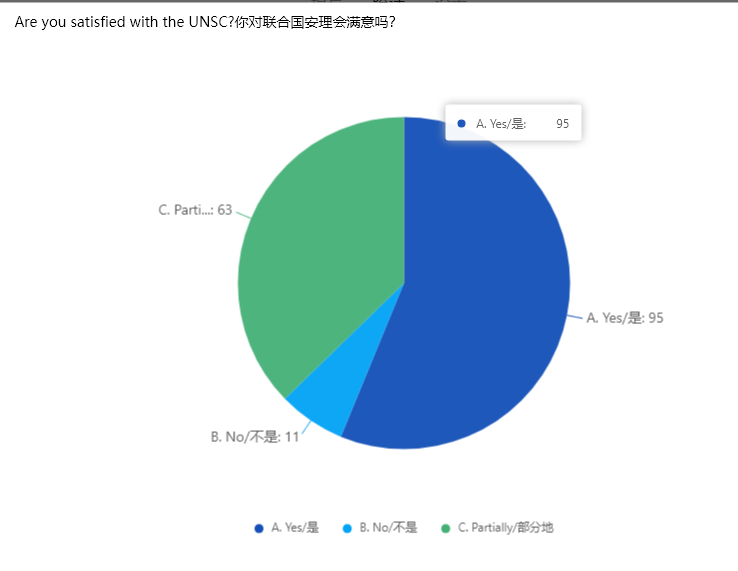 | Chat 8. Question No 4 Above |
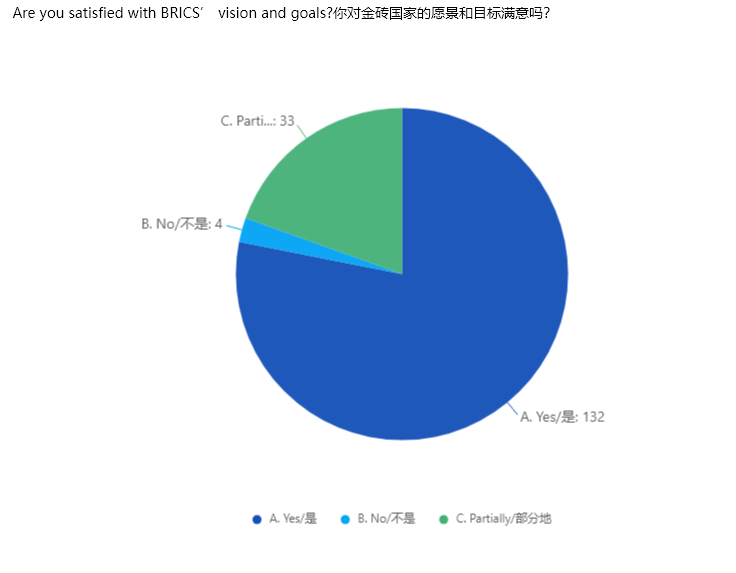 | Chat 9. Question No 5 Above |
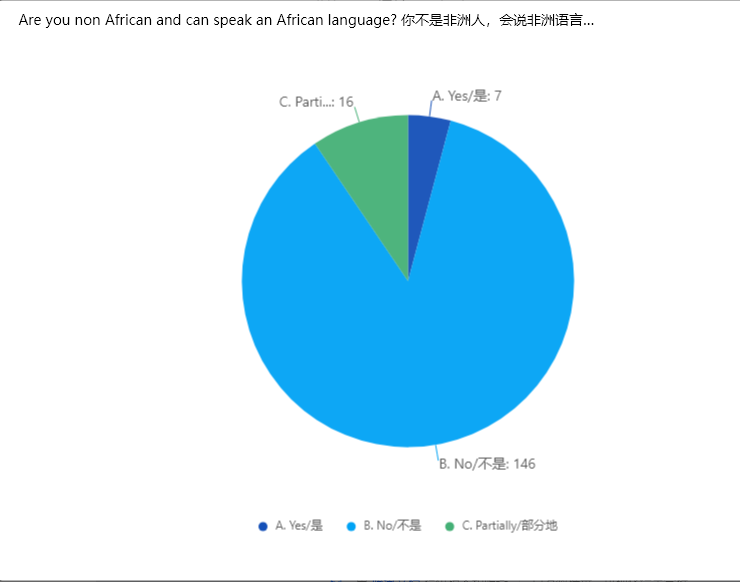 | Chat 10. Question No 6 Above |
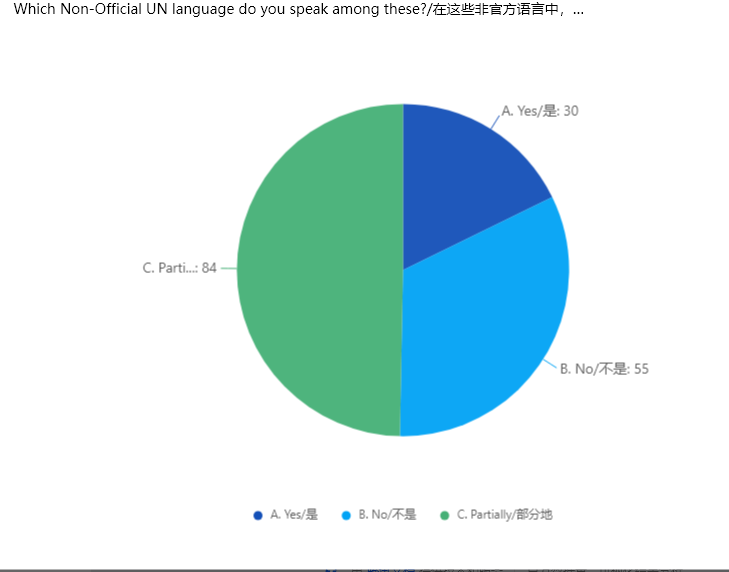 | Chat 11. Question No 7 Above |
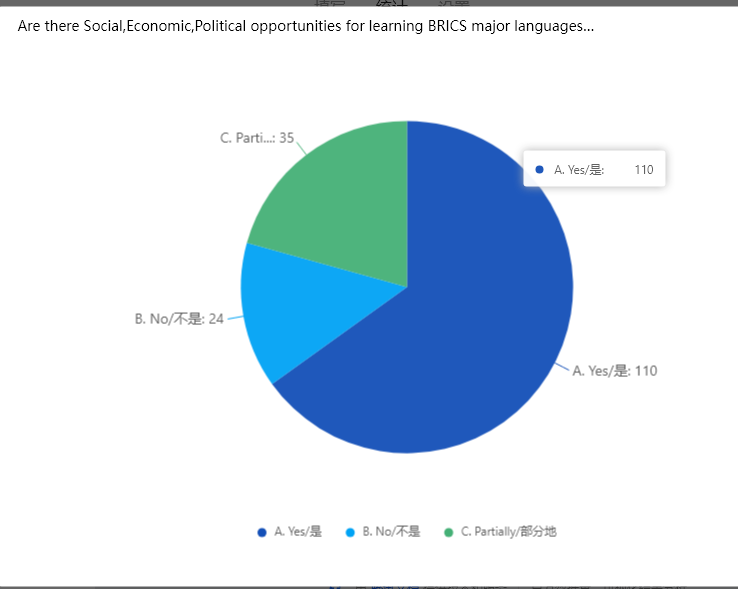 | Chat 12. Question No 8 Above |
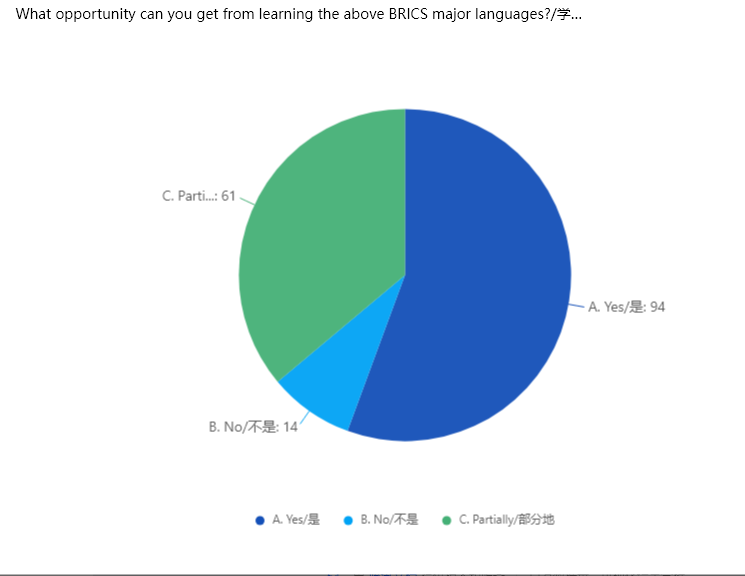 | Chat 13. Question No 9 Above |
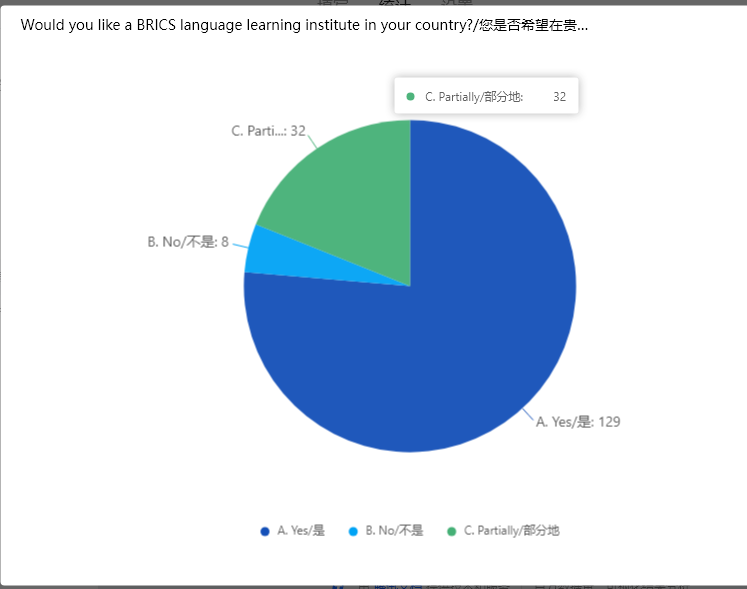 | Chat 14. Question No 10 Above |
References
| [1] | Akhmetshin E.M, Makulov S I et al, (2017), Overcoming of intercultural barriers in Educational Environment: SERIALS Publications. |
| [2] | Armijo LE and Roberts C (2014): The emerging powers and the global governance: why the BRICS matter, Hand book of emerging economies, 503-524. |
| [3] | Barna. R.M (1997). In Ilie O.A (2019), Intercultural Communication barriers, China and the USA. |
| [4] | Bijami M, Kashef SH, Nejad MS (2013), Peer feedback in Learning English writing: Advantages and Disadvantages, Journal of Studies in Education 3(4), 91-97. |
| [5] | Cooper A.F (2016) The BRICS: a very short introduction, Oxford University Press. |
| [6] | Cortazzi M & Jin L (2013), Researching Culture of Learning International Perspectives on Language Learning & Education, Besingstoke, Hampshire. |
| [7] | http://louisville.edu.anthropology. |
| [8] | Isheloke BE (2019): Esperanto as an Auxiliary Language and a Possible Solution to the BRICS language Dilemma: A Case Study, Resspectus Philologius, 145-157. |
| [9] | Laidi Z (2012): BRICS Sovereignty power and weakness, International Politics, 49; 614-632. |
| [10] | Lie O.A (2019), Intercultural Communication barriers, China and the USA, The difficulties of dialogue, International Conference Knowledge based organization, Vol. XXV No 2 2019. |
| [11] | Liu Ping, Xi Jing, Bestoon Othman, F Yuefei, ZBA Kadir, Xiao Ping: (2019) Engineering Technology and Applied Science Research 9(2) 3971-3977. |
| [12] | Li Yuyun (2018). Development of cooperation in higher education in BRICS countries: Changing Societies & Personalities Vol 2. Issue. 42(4), 393-405. |
| [13] | Luckhurst J (2013): Building cooperation between the BRICS and the leading industrialized states, Latin American Policy, 4(2) 251-268. |
| [14] | Lundvall BA (2009): BRICS and development alternatives: Innovation systems and policies, Anthem Press. |
| [15] | LUO Chaoping, ZHOU, Ning ZHAI Qiong, CAO Zhenglin: Cross-cultural Communication (2014). |
| [16] | Ningiza Q (2022): Should the African Union Be Granted a Permanent Seat in the United Nations Security Council? PQDT- Global. |
| [17] | Nistor P (2015): FDI implications on BRICS economy growth, Procedia Economics and Finance, 32; 981-985. |
| [18] | Nomnian S (2018) Chinese Overseas Students Perspectives on Benefits and Limitations of English Language Learning and Teaching between China and Thailand, Arab World English Journal (AWEJ) Vol 9 No 2. |
| [19] | https://dx.doi.org/10.2409/awej/vol.9.217. |
| [20] | Ribeiro GL and Dwyer T (2015): Social, Political and Cultural Challenges of the BRICS, Langaa, RPCIG. |
| [21] | Wolff HE (2017): Language ideologies in post-colonial Africa, Stellenbosch Papers in Linguistics Plus; 51(1), 1-22. |
| [22] | UNESCO (2013), The international mobility of students in Asia and the Pacific, Bangkok: UNESCO. |
| [23] | Yue Qi G (2018), The importance of English in primary school education in China perceptions of students, Multilingual Education 6, 1-18. |
| [24] | Zeleza PT (2006) The inventions of African Identities and Languages, The Discurcive and Development Implications www.lingref.com.document #1402. |
| [25] | Zhengdong, Gan Gillian Humphreys, Liz Hamp-Lyons (2004): Modern Language Journal 88(2), 229-244. |





 Choose A,B/C
Choose A,B/C














 Abstract
Abstract Reference
Reference Full-Text PDF
Full-Text PDF Full-text HTML
Full-text HTML




